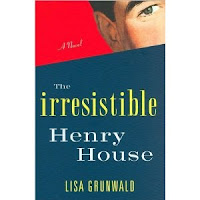Before free range parenting, before attachment parenting, before Dr. Sears, there was Martha Gaines. Martha runs the practice house at Wilton College in post-World War II Pennsylvania, a small, two-story home - complete with a practice baby - where young girls learn to become wives and mothers and housewives.
Every two years, Martha brings home a new practice baby from the local orphanage, and, using that baby, teaches a small group of girls how to become mothers. The girls rotate in and out each week, and as a result, the young baby gets a new mom every week. Practice babies are in high demand; babies who are raised in the practice house are considered the cream of the crop, and there is always a waiting list at the orphanage for those babies.
In the fall of 1946, Martha brings home Henry (all practice babies' names start with H), and in the spring of 1948, Martha refuses to let him go back to the orphanage, and so begins Henry's life as Martha's not-quite-son. Henry is raised in the practice house, with a revolving door of practice mothers and practice siblings. The story follows Henry's life through his first years with Martha to boarding school, to running away to New York, California, and even farther to London, and finally, his return home.
Henry isn't the most sympathetic character, but I knew I was supposed to care for him, and I did, but surprisingly, Martha - painted very much the villain - was the character I worried the most about. Watching Martha watch her practice house die as feminism pushed the program to extinction was heartbreaking, and in the end, I wanted what Martha wanted most: for Henry to love her and forgive her. But Henry, raised to expect the women in his life to cycle in and out, seemed incapable of doing that.
*Spoiler alert: What absolutely blew me out of the water with this story was the epilogue. All along, I'd been reading this book, thinking what an unusual concept this practice baby concept was, and then I got to the epilogue, which had a small black and white photo of a chubby, grinning, dark-haired baby. The baby's name was Bobby Domecon, the last name being short for "Domestic Economics", a class offered at Cornell University, and one that continued until 1969.

This sounds kind of like a really messed-up way to raise a kid. Obviously with orphans, care is better than no care, but man... this sounds like a baby would just grow up with a whole host of issues. What an intriguing concept.
ReplyDeleteThe baby did grow up with all kinds of issues. Henry was kind of a jerk. I understood why he was a jerk, but it really made me wonder about all the things we subject kids to and don't even realize it.
DeleteReally fascinating...